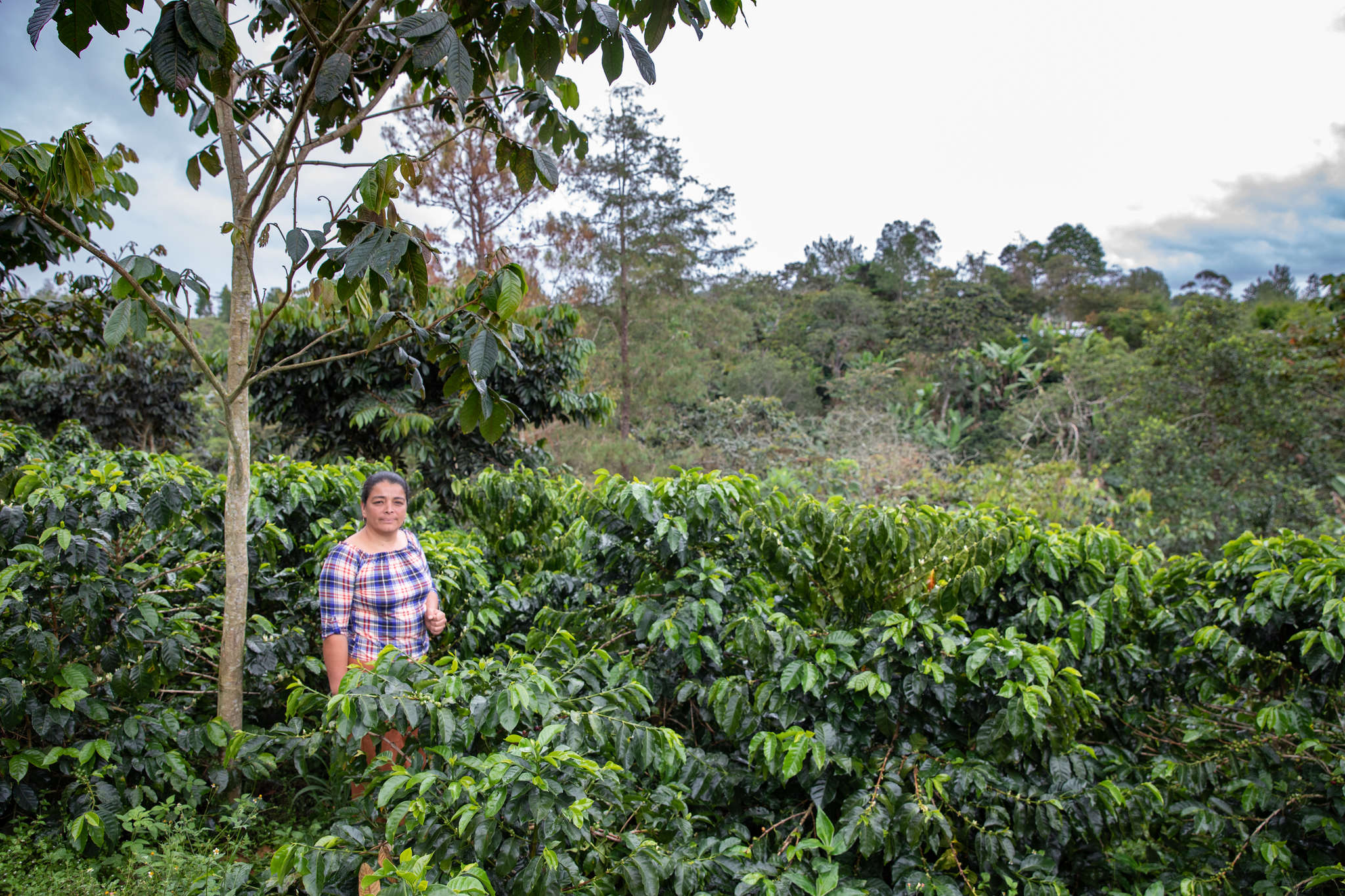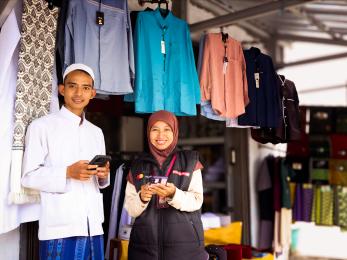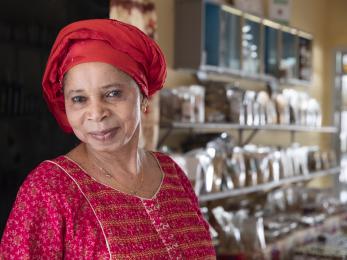Addressing anger, not just income, is key to fighting instability in Afghanistan
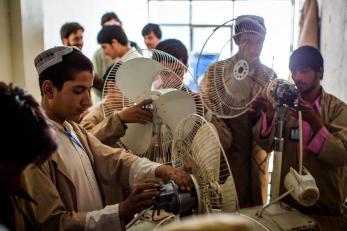
Just over 200 miles northwest of the Pakistani border lies southern Afghanistan’s commercial epicenter and the country’s second-largest city, Kandahar. It’s a dusty, bustling, beige metropolis teeming with traffic, motorbikes and military debris leftover from the city’s recent foreign military occupation.
Its main avenue is lined with modest shops where a slew of small tradesmen hawk their wares daily: mobile phones, fruits and vegetables, ironwork, hardware.
The city limits give way to the agricultural farmland Kandahar’s economy is built on: grapes, pomegranates and plenty of the region’s most infamous crop, opium poppies.
In nearby Sarpoza bazaar, 25-year-old Ahmad Mohammad* mans his newly-opened mobile phone repair shop, where he now spends most of his time.
Until completing Mercy Corps’ job skills training program several months ago, Ahmad barely made ends meet as an ad-hoc unskilled laborer, sporadically finding work like selling dried fruit and working at a telephone kiosk.
Now Ahmad owns his own business, and he has newfound optimism about building his picture of success: a happy family.
But a lack of job opportunities is just one of the obstacles young Afghans like him are struggling against. Even though he now has a business and technical skills, Ahmad still worries about the lawlessness inherent in his community.
The harsh reality is that with or without employment, Afghans face incredible challenges in building secure lives for themselves, including corruption, discrimination, weak governance, poverty and conflict.
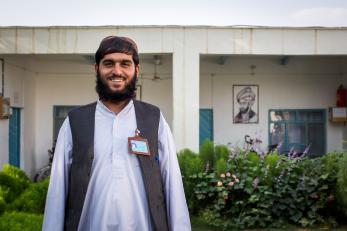
But Mercy Corps, which has worked in Afghanistan for 30 years, believes young people like Ahmad can forge a safer, more secure Afghanistan. The caveat is: Empowering these youth to build a better country requires an extensive and long-term investment, a commitment enough that they can overturn the systemic obstacles that perpetually hold them back.
That’s why we’re adapting our current vocational programming to provide the comprehensive support youth need to beat the odds and build more promising futures.
Corruption stifles hopes
Decades of conflict have severely impeded Afghanistan’s development. Many families don't have access to the housing, clean water, electricity, medical care and jobs they need. And according to The World Bank, more than 30 percent of the population lives below the poverty line.
In Kandahar, which headquartered the Taliban until its overthrow in 2001, 20 percent of people have been uprooted by violence at least once in their lifetime.
Volatility and a lack of adequate schools and teachers have made education a low priority and an opportunity for a privileged few: Only 7 percent of the population over 16 in Kandahar is literate.
Additionally, corruption within the government means resources like jobs, schooling and access to public services are available based solely on who one knows — or who can afford to pay for what they need.
“People from within informal power circles get promoted, and access to resources is managed by families and people in power,” says Camilla Higgins, Mercy Corps training and skills manager in Afghanistan. “Someone could have done everything right, but if they don’t know the right person they’re out of luck. It does make people give up hope.”
Simply put, anyone wanting to build an honest, secure life for their family must navigate an obstacle course filled with nepotism, corruption and violence.
Addressing anger, not just income, is key
Stories of mistreatment, dishonesty and abuse are commonplace in Kandahar. Official and unofficial forces roam the streets unregulated, and brutality is not unusual.
We have heard of ordinary citizens being taken away for “questioning” by men in uniform — and while the men in these scenarios may be members of official security forces, it’s equally as likely they are imposters in fake regalia.
It's not uncommon for people to be taken into custody or to disappear altogether without explanation. And worse, family members and neighbors can't inquire about these incidents for fear of further ill-treatment.
Pervasive frustration and hopelessness over these injustices motivate many to turn to illegitimate livelihoods, like growing poppies or joining an insurgent group, that provide a greater sense of power but in turn fuel the country’s continued insecurity.
Young people like Ahmad are particularly excluded from positive opportunities, most lacking any access at all to the education, jobs, civic engagement or social outlets that would give them a fulfilling, productive place in society.
Our recent research shows this lack of social inclusion — in addition to having grown up in an environment of conflict — makes young people particularly vulnerable to participating in violent or illegal activities.
“I recently heard a story from a young Afghan that he felt the favorite pastime for young males [in Afghanistan] was to form gangs around certain things, even the characters in a TV drama, and fight each other,” Higgins says.
“This really sums up how young people absorb and imitate what they see around them. And forming gangs is a way of feeling part of something and having a sense of identity, which is so important in adolescence,” she continued. “For many young people [here], the only reference point they have is violent groups.”
And what better pool of recruits for armed groups and criminal gangs than a population of impressionable young people who feel like they have no other options?
Most Afghans are under age 35
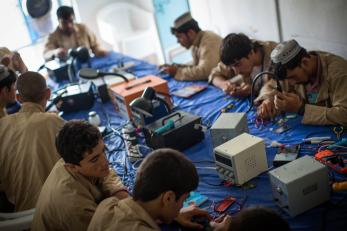
Had 24-year-old Ramin Mohammad* not also participated in Mercy Corps’ job skills training, he says he would have joined the army. It doesn’t matter that Ramin completed 12th grade and is among the few in Kandahar who can read and write: Social networks get you a job, he says, echoing the same feelings of resentment and isolation that sound throughout the region.
But young people like Ahmad and Ramin are, in fact, the people who will eventually be leading the charge in Afghanistan. The country has one of the world’s youngest and fastest-growing populations: 75 percent of Afghans are under the age of 35.
Our goal is to reach this capable — but vulnerable — population before they turn to unlawful options for inclusion, instead providing opportunities that empower them to drive lasting, positive change.
Our vocational skills training program is a cornerstone of this work. The initiative provides young people with job skills — sewing, mechanics, mobile phone repair, computers — that are in demand in the local market.
Students attend classes taught six days a week for three months, graduating with hands-on training, starter equipment and basic business knowledge.
Learn more: Women breaking down barriers in southern Afghanistan ▸
Over the past five years, the program has generated more than 20,000 new enterprises in Afghanistan and helped its participants build more stable lives and better care for their families.
It also extends education to those for whom it would otherwise be out of reach.
“I learned about the program from a former student who took the mobile [phone] repair course,” says Ahmad. “He started his own business.”
Encouraged by his wife and family, Ahmad jumped at the chance to build upon his sixth-grade education and learn a skill that could earn him a steady income. Without the training, he was resigned to unemployment or inconsistent daily labor.
“It was very worthwhile,” he told us. “Before I did basic work and now I have a technical skill.”
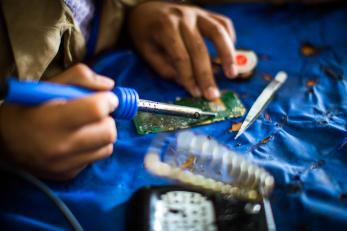
But his ability to work and earn money is still vulnerable to political instability and corruption.
“There is a lack of law and order here. You never know when someone will break in and wreck your shop,” says Ahmad. “[Here] you need to know people to investigate such issues and resolve them. You need power to feel safe and supported.”
Without a social network that protects him, Ahmad is often too afraid of being robbed to invest in more equipment for his business. And when he does purchase supplies, he undergoes heavy scrutiny and questioning from the police.
Ahmad’s struggle supports our research findings as well as those of USAID, and what a trove of experts remarked at a meeting of the UN Security Council in April 2015: It isn’t unemployment or poverty that push young people toward violence — it’s anger.
We believe the way to promote stability, then, is to offer resources that prevent their feelings of rage and resentment.
Investing in youth for long-term change
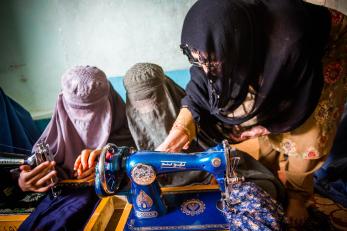
“Young people need support beyond just skills to enter the market,” Higgins says. “They also need access to opportunity, and knowledge of how to make the most of that opportunity and of what support exists for them in the local environment.”
Last year we introduced an emotional and life skills curriculum to our vocational programming in Kandahar to give youth the tools to cope with frustrations and work toward a better future.
“[The program] represents a more holistic approach to the needs of the population by providing skills that we believe will increase the employability of youth, but also help them navigate other challenges in life,” Higgins continues.
Through the program, graduates of our job skills courses attend ancillary classes to learn more business skills, along with lessons like effective communication, managing emotions, team building and decision making.
The classes have the added benefit of providing youth with an additional social outlet and opportunity to expand their network, which is critical for them to form business connections and feel supported in their community.
However, this curriculum is not a quick fix. The lessons we’re introducing are countering long-held beliefs and societal norms that tell youth the only way they can gain respect and independence in their community is through violence, bribery and corruption.
Still, we are determined to change those narratives. We have to.
Youth like Ramin and Ahmad represent a powerful source of ingenuity, hope and strength against the incredible challenges that keep their communities from prospering.
And because eventual peace and development are dependent on the presence of young people who are prepared for positive, productive roles in their societies, in Afghanistan and around the world, Mercy Corps is in it for the long haul.
*Name has been changed to protect identity and safety.
